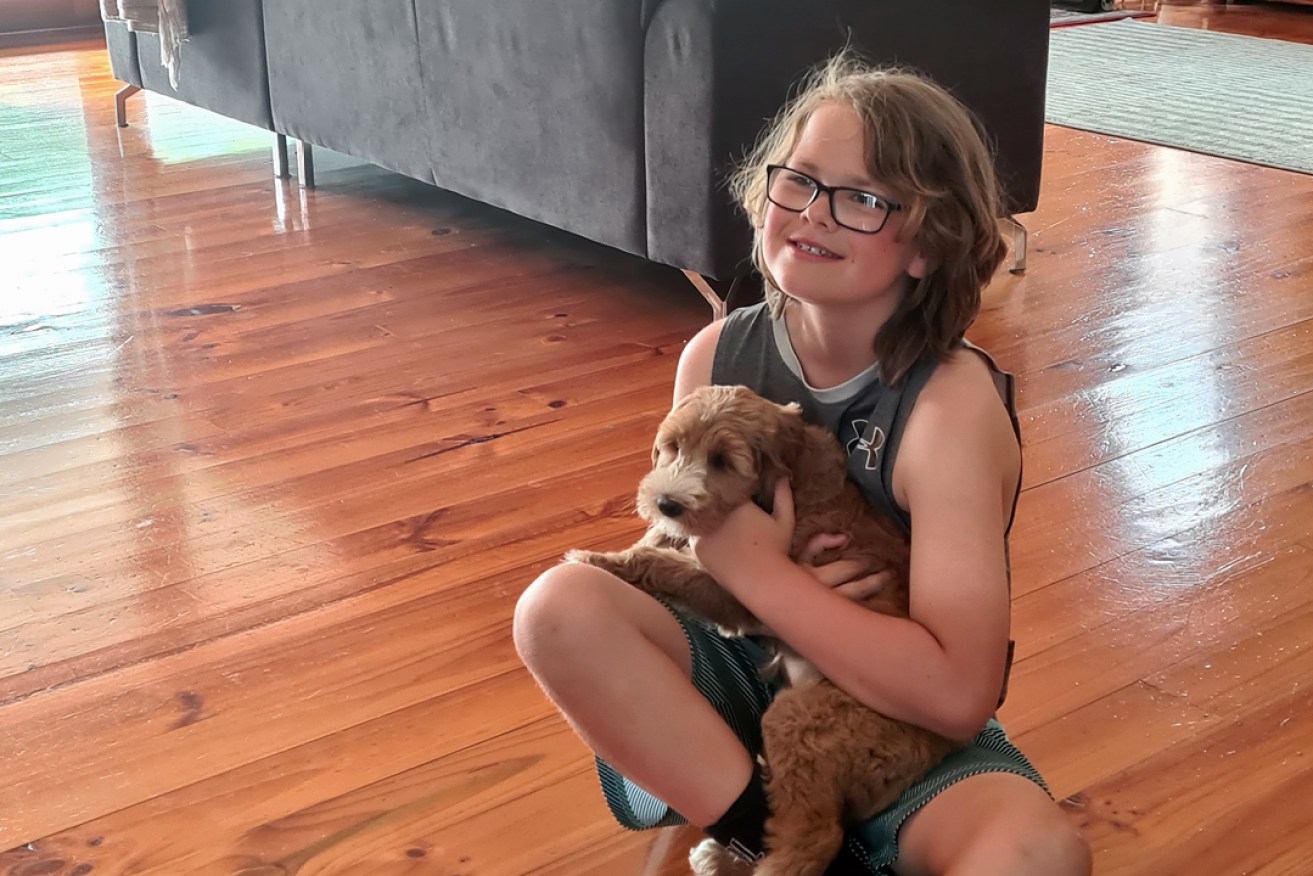Puppy boom leads SA’s pet industry out of the dog house
Veterinary clinics, puppy schools and dog grooming businesses are booming following a surge in the number of South Australians buying “isolation buddies” during the coronavirus pandemic.


Oliver, pictured with 10-week-old labradoodle Robbie, is among hundreds of South Australians to bring home a new puppy since the beginning of the coronavirus pandemic.
Findon Vet Surgery and Seaton Vet Centre practice manager Mollie Linnett said the western suburbs clinics were among a number of the state’s pet services experiencing a backlog as new dog owners sought to vaccinate and train their pets.
“We’ve definitely seen a lot of people get a lot of isolation buddies… that’s led to more general routine health appointments. Our puppy preschool has been really busy as well,” Linnett said.
She said while there had been a spike in the number of people purchasing pets in the past 12 months – causing the price of puppies to skyrocket – obedience schools had also been forced to reduce their intake per class to comply with social distancing requirements.
South Australian puppy schools are trying to make up for the reduced number of dogs allowed in each class by increasing the number of obedience sessions held each week, according to the Australian Veterinary Association.
But many young dogs are still missing out as a result of the backlog, with dogs growing too old to get into a class before availabilities opened up.
Linnett said pet owners who were unable to get into a class but were still keen for their pup to meet other dogs should go to socialising sessions.
“It’s easy enough to learn how to train your pet from YouTube videos,” she said.
“You can teach your pet at any age how to sit, drop and stay but it’s the critical socialisation that it’s really tough for some puppies to miss out on.”
The RSPCA recommends puppies are socialised when they are between four and 16 weeks to shape their behaviour.
Linnett said the influx in dog ownership had also spilled into the vet centres’ grooming services, which were fully booked out “weeks in advance”.
“I don’t think that has been exclusive to us either – I think pretty much all groomers around the state have been that way,” Linnett said.
Adelaide Animal Emergency Centre veterinarian David Mason said the hospital, which usually performed emergency procedures, had begun seeing animals for routine procedures with vet clinics inundated with puppies and kittens needing to be vaccinated and desexed.
South Australian dogs and cats are required to be desexed by six months old or within 28 days of possession. The law was introduced in 2018 in a bid to reduce the number of backyard breeders and animals entering shelters.
“Most clinics have increased their services so that people can get in… they’re doing everything they can to try and ensure the pets are given the best possible opportunity early on,” Mason said.
“There’s been an increase in what I’d define as non-emergency procedures because vet clinics are full and they’re not able to see clients for what I would say are normally fairly routine procedures: a sore foot or a sore ear or something that could potentially wait.”
The surge in people buying animals has not been limited to puppies. Adelaide’s RSPCA shelter adopted out 5396 animals in 2020 – a new record for the centre.
Of the total number of animals adopted last year, 963 were dogs and puppies, up from 720 in 2019.
The total number of animals given up was also down in 2020 compared with the year before, with 7976 animals surrendered last year compared with 8276 in the previous 12 months.
RSPCA SA head of animal operations Tim Charles said concerns an increase in adoptions during the coronavirus would lead to more animals being surrendered or euthanised in the coming months didn’t seem likely.
“When COVID hit we certainly did adopt a lot of animals out and we haven’t seen an increase of animals coming back into the shelter,” he said.
“I think one of the benefits that COVID had was a lot of people had time to spend with their pet when they first got it home, so the introduction to the home was really good.
“We’re not seeing an increase now that people are starting to return back to work. We don’t see it as a major problem for us.”
Instead, the desire for animal companionship has continued.
Dogs SA president Brian Parker, who is also a breeder, said canines remained in high demand.
“I get two to three calls a day for Siberian Huskies – before I’d get three to four a month. People still want them,” he said.
“But since COVID I’ve not bred a litter because I’m scared while they might be great when they’re puppies when the dog becomes a bugger in their life what are they going to do? Are they going to try and hand it back or hand it to the pound? Or just leave it in the backyard because it’s interfering?
“A lot of the Dogs SA breeders have the same concerns to a point where they’ve put contracts on the dogs which pretty much says: if for any reason the dog no longer fits in with your lifestyle the breeder gets first right of purchase to buy it back.”




